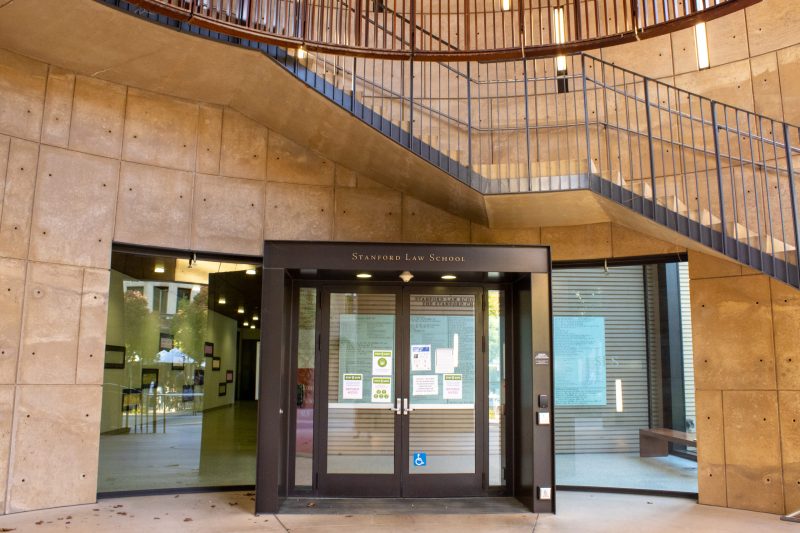Experts in international law raised concerns about weakened judiciaries in Latin America during a panel hosted by Stanford Law School’s Rule of Law Impact Lab and the Inter-American Dialogue. Speakers contended that several democratically elected leaders in Latin America turned their backs on basic democratic freedoms and explored how independent courts could introduce checks on executive power.
The discussion was led by Amrit Singh, a professor of practice at Stanford Law School and executive director of the Rule of Law Impact Lab. Panelists included Daniela Salazar Marin, Constitutional Court of Ecuador judge; Luis Roberto Barroso, Supreme Federal Court of Brazil justice, and Sidney Blanco, a former magistrate of the Constitutional Chamber of El Salvador’s Supreme Court.
President and CEO of the Inter-American Dialogue Rebecca Bill Chavez opened the panel with a declaration that “assaults on the rule of law play a central role in today’s democratic recession.”
“The threat to liberal democracy is no longer a military coup and an abrupt break in the constitutional order,” Chavez said. “Instead, what we’re seeing is democratically elected leaders assuming power and then deliberately and gradually undermining basic guarantees such as judicial autonomy, electoral integrity and freedom of expression.”
She continued by saying that she believes an authoritarian government may emerge soon in these countries, starting with the “stripping of the judiciary of its independence” by taking away electoral freedom.
“We’ve seen this happen across much of the Americas,” Chavez said. “But in contrast to this bleak picture today, we have the opportunity to focus on the positive[s] we’re going to hear about, [such as] courts that have fulfilled their constitutional role of checking the abuse of executive power.”
Barroso praised Brazil’s judiciary system, which he said kept the leaders’ power in check. The change from paper ballots to an electronic system helped eliminate electoral fraud, Barroso said.
“This is maybe very unique of Brazil to have the elections run by the judicial branch,” Barroso said. “Using electronic ballot boxes without any sort of the paper trail [under] the new system, this electronic ballot system just eliminated in Brazil, for good, the electoral frauds that previously occurred with the manual counting of paper ballots.”
Whereas Barroso explained that Brazil’s judiciary was able to improve in the preserving of democracy, Salazar said Ecuador’s judiciary failed to prevent democratic backsliding.
“As a consequence of these events, the country will go to elections for a new president and for new members of Congress,” Salazar said. “In a few weeks we should know the results however, the long term … negative impact on the court’s legitimacy given this constant exposure to highly controversial political decisions in a highly polarized country like Ecuador … that remains unknown.”
In addition to using power over the judicial system to their advantage — for example, by filling the Supreme Court with submissive judges — Barroso said most authoritative rulers rise to power by speaking directly to followers. While bypassing intermediaries such as the press, these politicians may tend to overuse hate speech, slander, character assassination and conspiracy theories.
Barroso drew a parallel between the Jan. 6, 2021 Insurrection at the U.S. Capitol and the Jan. 8, 2023 riot in Brazil, when outgoing President Jair Bolsonaro’s supporters raided the government buildings after his leftist successor Luiz Inácio Lula da Silva took office. In both cases, the judiciary played an important punitive role, especially in dealing with the lawsuits that followed.
“The [U.S.] Supreme Court and the Judiciary [Branch of Brazil] are very zealous [in] … preserving democracy, so there are similarities [between the two insurrections],” Barroso said. “I think in both countries, the judiciary was a part of containing any attempt [to disrespect] the results but … in Brazil, we went even further by stripping the former president of political rights.”
Salazar said that in his experience it was important to strengthen constitutional design and legal mechanisms in addition to practice. “Judges need to understand that the decisions of the Court end up having a political impact, but the decision cannot be based on political grounds.”
When there is a threat to democracy, judicial independence is key, according to Tamara Taraciuk Broner, who directs the Peter D. Bell Rule of Law Program, who concluded the panel. She explained that judicial activism is not destructive if judges are setting democratic limits for politicians.
“We need judges to do the very difficult job [of setting democratic limits] to carry out in polarized environments,” Broner said, as she called on the international community to support judges in this endeavor. “It is a much-needed task, and judges who do this bravely must receive the support from all of us who care and are concerned about the democratic decline in the region.”
